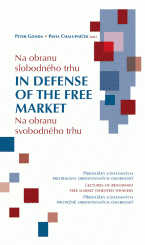 |
|||||||
| INSTITUTE | CONSERVATISM | M.R.STEFANIK |
| NEWS
|
[04.05.2009, The Slovak Spectator, NEWS]
Interblue Group, a company registered in the United States just a few months before the contract was signed, bought 10 million excess tonnes of emission quotas from Slovakia at a price of €6.05 per tonne. Prime Minister Robert Fico ordered Chrbet to disclose the terms of the contract on April 25. “If it turns out that the minister of the SNS, who is in charge of the matter, has proceeded contrary to the law, he will be recalled,” Fico told TV newschannel TA3. Chrbet's SNS colleague, Construction Minister Ivan ©tefanov, faced similar pressure from Fico to kill the infamous bulletin-board contract over which the European Commission brought an infringement proceeding against Slovakia. However, by April 29 neither the media nor critics of the deal had had a chance to peek into the contract since Minister Chrbet argued that he needed permission from Interblue Group to disclose the details. Radovan Kazda of the Conservative Institute think tank said that some serious questions are emerging over this lack of transparency. “It all indicates that the sale really took place under non-transparent conditions, which is without a public tender and publishing of the sale conditions,” Kazda told The Slovak Spectator. “This is indeed the least transparent way to sell a product which is owned by the state. In fact we can mark it as a corrupt proceeding on the part of the ministry.” Article was published in the Slovakia`s English-language weekly The Slovak Spectator. |
 English | Slovak
English | Slovak
This website was created also thanks to funding granted by The Trust
for Civil Society in Central and Eastern Europe.
Website powered by Metafox CMS from Platon Group.
|
Conservative Institute of M. R. Stefanik |
Tel.:
+421 258 100 188 |

 After much prodding, Slovakia’s environment minister has agreed to disclose details of a contract which appears to have come as a stroke of genius – or something else – for a newly-formed company that was able to buy excess emission quotas from Slovakia for only two-thirds of the price the firm would have been charged by the Czech Republic or Ukraine. Environment Minister Ján Chrbet, a nominee of the Slovak National Party (SNS), a junior member of the ruling coalition, has been showered with criticism for both the sale itself and his reluctance to disclose details of the contract after the opposition Slovak Democratic and Christian Union (SDKÚ) party claimed that Slovakia probably lost tens of millions of euros on the deal.
After much prodding, Slovakia’s environment minister has agreed to disclose details of a contract which appears to have come as a stroke of genius – or something else – for a newly-formed company that was able to buy excess emission quotas from Slovakia for only two-thirds of the price the firm would have been charged by the Czech Republic or Ukraine. Environment Minister Ján Chrbet, a nominee of the Slovak National Party (SNS), a junior member of the ruling coalition, has been showered with criticism for both the sale itself and his reluctance to disclose details of the contract after the opposition Slovak Democratic and Christian Union (SDKÚ) party claimed that Slovakia probably lost tens of millions of euros on the deal.





